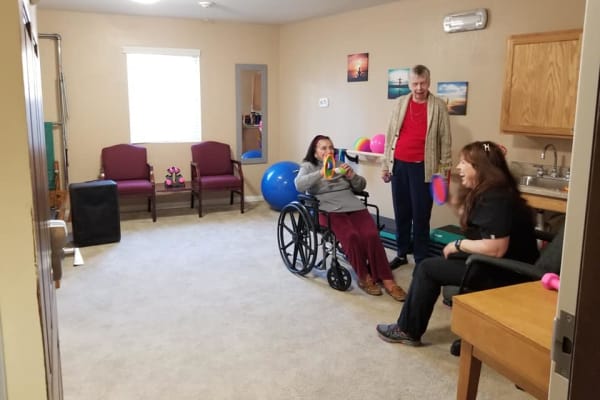Best Vitamins for Seniors concerned with Dementia or Alzheimer’s Disease
It's no secret that a healthy diet for seniors is important, but for seniors living with memory issues the right diet and vitamin intake can help improve quality of life. Almost 48 million people worldwide are living with Alzheimer’s Disease. It is currently the sixth-leading cause of death in the United States. Of seniors, it is believed that 1 in 3 will be affected by Alzheimer’s Disease. It is a natural concern for all seniors, and though there is no known cure for Alzheimer’s Disease there have been interesting studies on what might help slow down, or even prevent, the disease.
What Vitamins are Good for People Concerned about Memory Care?
A lot of research has gone into studying different diets in order to discover commonalities to prevent or delay Alzheimer’s Disease including changing diets to include certain vitamins or even taking supplements to increase vitamin intake. Experts are clear though, vitamins do not fight the underlying cause of Alzheimer’s and are in no way a cure.
Vitamin D
Research suggests that people with very low levels of vitamin D in their blood, a condition known as vitamin D deficiency, are more likely to develop Alzheimer's disease and other forms of dementia. Vitamin D, which can come from food or our skin when stimulated by sunlight, is essential for our health and brain development. People with lower vitamin D levels appear to have a higher risk of age-related diseases, including cognitive decline and dementia. While a few small studies suggest that vitamin D supplementation may improve some aspects of cognitive functions, no studies have confirmed that it can protect against dementia. Vitamin D is usually safe when used as directed.
Sources of Vitamin D
The primary way to increase your levels of Vitamin D is through exposure to sunlight. Studies have shown that being outside in the sunlight, even for short periods of time, can have significant positive effects on the body. Vitamin D occurs naturally in only a few foods, including fatty fish (albacore tuna, wild salmon, herring, mussels, etc.) and fish-liver oils. The most common dietary sources of vitamin D are fortified foods, such as milk, breakfast cereals and orange juice. Vitamin D supplements also are widely available and inexpensive.
Vitamins B3 and B12
Vitamin B-3 (or Niacin) has recently been proposed as an alternative for treating Alzheimer’s disease. In an older study, large doses of nicotinamide — also referred to as B-3 — reversed Alzheimer’s-related memory loss in mice. Larger studies are occurring to see if they can replicate these results in human beings. Vitamin B-12 is another form of vitamin B that plays a role in cognitive health. A deficiency in vitamin B-12 may mimic signs of Alzheimer’s like behavior changes, increased agitation, and memory loss. Several studies have linked a vitamin B-12 deficiency with symptoms of Alzheimer’s and actual shrinkage of the brain.
Sources of Vitamin B3 and B12
B3: Liver is one of the best natural sources of niacin. Chicken, especially breast meat, is a good source of both niacin and lean protein. Tuna is a good source of niacin and a great option for people who eat fish but not meat. Other sources can include turkey and anchovies. Vegetarian sources include avocado, peanuts, whole grains, mushrooms, green peas, and potatoes.
Vitamin B12 is found in a variety of foods and not getting enough can have dangerous side effects. You can try to incorporate more of these foods in your diet to ensure you are getting the vitamin B you need to stay healthy (with the approval of a physician): legumes (beans), Milk, Eggs, Salmon, Leafy green vegetables, Shitake Mushrooms, and clams.
Omega 3’s
It is often said that fish is 'brain food', and you may have heard that omega-3 in the diet can help reduce your risk of dementia by improving heart and brain health. This is tied to the so-called Mediterranean Diet and the link to lowered instances of Alzheimer’s Disease of those who eat that diet. There is good evidence that eating fish, which contains omega 3, is good for your health. There have been reports that it may reduce the risk of developing dementia, especially when it is eaten as part of a healthy diet. However, it should be noted that the diet may be healthy, and there is not enough evidence that omega-3 itself is behind this benefit.
Sources of Omega 3’s
Salmon and other cold-water fish, such as halibut, tuna, mackerel, and sardines, are rich in omega-3 fatty acids. Other omega-3 sources include beans, some nuts, flax seeds, and healthy oils, like olive oil. Nuts and seeds such as almonds, walnuts, macadamia nuts, hazelnuts, cashews, sunflower seeds, pumpkin seeds, are suggested. Legumes like beans, peas, lentils, pulses, peanuts, and chickpeas are a great source, as are tuber-like potatoes, sweet potatoes, turnips, and yams.
Vitamin C
Vitamins C is an essential vitamin for all people, regardless of age. People who consume high levels of these vitamins through their diets have a lower risk of dementia, although it remains unclear whether the key factor is a healthy diet or the specific vitamins. Interestingly, supplements do not appear to offer the same protection as naturally occurring sources of Vitamin C.
Sources of Vitamin C
A healthy diet naturally rich in vitamins C is likely to offer the most benefit. Citrus fruits, sweet peppers, and Brussels sprouts are rich in vitamin C. Fruits that are not regularly consumed have high Vitamin C content, such as guava, kiwi, and papaya, so you don’t have to focus strictly on oranges and grapefruit. Because vitamin C absorption is limited to about 400 mg/day, higher doses are unlikely to be more beneficial.
Dining Services at Ridgeline
At great example of the type of culinary leadership, Chef Gary at Lakeview Terrace over three decades in the fine art of cooking and entertaining, including fifteen years as a Private Chef, cooking for celebrities and world leaders. With prestigious training at the National Cooking Institute, he is a classically trained Chef and is dedicated to creating delicious foods for the broadest range of palettes and dining preferences. His culinary achievements have been featured in Santa Barbara Food and Home Magazine, Westways Magazine, and on the Food Channel. His culinary journey has led him to realize a passion for working with and serving seniors. Prior to arriving at Lakeview Terrace, Gary worked as an Executive Chef at a large senior living facility in Southern California. He is excited to now live and work in beautiful Boulder City in a high-quality smaller senior living setting. Chef Gary’s practice is to create healthy, delicious meals using the absolute best ingredients available. Contact us today to learn more about the dining and nutrition at your one-of-a-kind community.
References
- “Alzheimer's Facts and Figures Report”, alz.org, Accessed February 2021
- “Vitamin D: Can it prevent Alzheimer's & dementia?”, MayoClinic.org, Accessed February 2021
- “16 Foods That Are High in Niacin”, HeathLine.com, Accessed February 2021
- “Vitamin B12 - Health Professional Fact Sheet”, NIH.gov, Accessed February 2021
- “Top 10 Foods Highest in Vitamin C”, MyFoodData.com, Accessed February 2021


